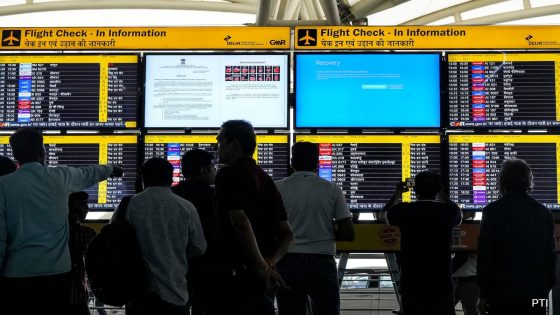The outage, attributed to an update by CrowdStrike, disrupted Microsoft’s Windows systems.
New Delhi:
Airports across India are still grappling with issues from yesterday’s massive Microsoft outage. Although the situation has improved significantly since Friday’s chaotic scenes, passengers continue to face challenges, particularly at Delhi’s Indira Gandhi International Airport (IGI).
At Delhi’s IGI Airport’s Terminal 3, passengers experienced some improvement today, but a few problems persist. Yesterday, the automatic self-drop baggage and check-in machines were non-functional, causing long queues outside Gate No. 5 in Terminal 3. While many passengers can print out their boarding passes today, international travellers still face issues with boarding pass generation, with some being issued manual passes inside the airport.
The Digi Yatra machines at Gates 1-3, which facilitate seamless entry, remain non-operational, necessitating manual entries. Display boards showing wait times, flight schedules, and other crucial information, which were down yesterday, are now functional. However, the overall system has not yet fully recovered, as confirmed by airport officials.
Mumbai’s Chhatrapati Shivaji Maharaj International Airport fared better than its counterparts in Delhi and Bengaluru. Although long queues were reported, operations are running more smoothly today. Nonetheless, two flights, one to Varanasi and one to Kochi, were cancelled this morning, and several international flights were rescheduled. This is an improvement from yesterday when nine domestic flights, all operated by IndiGo, were cancelled. IndiGo has warned of potential cancellations today but expressed optimism that yesterday’s disruption will not be repeated as the Microsoft outage was not reported today.
Global Outage
The outage, attributed to an update by global cybersecurity firm CrowdStrike, disrupted Microsoft’s Windows systems worldwide, affecting financial institutions, airlines, hospitals, and media channels. In India, this caused airline check-in systems to crash, leading to delays and the cancellation of dozens of flights. IndiGo alone cancelled around 200 flights, with hundreds more delayed as manual check-in procedures significantly slowed the process.
The Indian financial sector experienced minor disruptions at about ten banks and non-banking financial companies (NBFCs), which have largely been resolved, according to the Reserve Bank of India. However, the outage’s impact on airports from Chennai to Delhi was severe, with passengers facing long queues due to unavailable web check-in services and manual ticketing processes.
Airlines such as IndiGo, Akasa Air, Vistara, Air India, SpiceJet, and Air India Express acknowledged the issues via social media. Passengers received handwritten boarding passes, and the manual ticketing and luggage check-in process extended to 30-40 minutes per person, leading to frustration and overcrowded lounges.
Other Airports
Besides Delhi and Mumbai, high-density airports like Bengaluru and Chennai saw the most significant impacts. At Bengaluru’s Kempegowda International Airport, airlines such as IndiGo, Akasa, SpiceJet, and Air India Express initiated manual check-ins to ensure minimal disruption. The technical glitch has been fully resolved at Bengaluru airport, and operations have returned to normal. However, there is slight congestion due to the residual impact of yesterday’s operational delays. Due to the backlog, it will take a few hours for the crowds to clear.
Hyderabad’s Rajiv Gandhi International Airport experienced cancellations of 23 flights, including IndiGo flights to Visakhapatnam, Tirupati, Ahmedabad, and Bengaluru.
Ministerial Assurances
Union Civil Aviation Minister Rammohan Naidu assured that the ministry and the Airports Authority of India (AAI) are managing the situation using manual methods to minimise disruption. Minister for Information Technology Ashwini Vaishnaw confirmed that the outage’s cause had been identified and updates released to resolve the issue.
CrowdStrike confirmed the problem was due to a defect in a content update for Windows hosts and not a security incident or cyberattack.
Source Agencies



